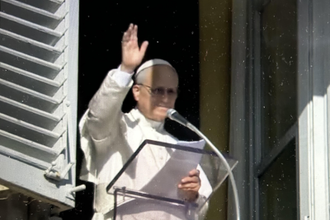Cardinal tells Food Summit: 'Africa needs water, not GM crops'

Cardinal Wilfred Napier
At the Rome Food Summit which opened yesterday, Cardinal Napier, Archbishop of Durban, said: "I have the impression that this organization does not know what the real problems of nutrition in Africa are. Africans do not need GMOs (genetically modified organisms), but water. We have our crops that grow well without genetic modifications, as long as you give them enough water. Well help us to build wells, dams and aqueducts; GMOs do not need it.”
In a new report, development agency Progressio warned that many millions of people in poor countries will go hungry when future global food crises strike unless the world's half a billion small-scale farms, and the poor people who work them, receive urgent funding and support from the UK and other governments.
The report: Fertile Ground, says that decades of neglect by governments of small scale farmers who feed 2 billion people worldwide - a third of humanity - have stretched poor farming communities to breaking point, requiring urgent action. The report notes that last year's global food crisis:
* Added 44 million people to those already undernourished
* Drove 110 million more people into poverty
* Pushed up the price of some commodities by 200 per cent
The report states: "Our global food system is in crisis. The number of hungry people on our planet is rising steadily and for the first time in history has now passed the 1 billion mark. Governments meeting in Rome must face the facts and take action now in order to be confident of feeding the estimated billion people who will share our planet by 2050."
Fertile Ground reports a dramatic decline in the amount of aid spent on agriculture, which has fallen by 83% in the past 30 years, as governments and other donors favoured intensive, large-scale solutions to the modern challenges of food production. In the process, small-scale farmers have been left behind. The report cites many threats and trials facing small-scale farmers:
* Climate change will leave 40 per cent of sub-Saharan African countries facing the risk of significant declines in crop and pasture production
* 2.6 billion people are already affected by significant levels of land degradation
* 80% of farmers in Africa and 40% in Latin America and Asia still rely on their own labour and hand tools. Many lack access to technical expertise which could help boost production.
Petra Kjell, Progressio's Environment Policy Officer said: "The UN's Food and Agriculture Organisation (FAO) suggests that governments spend $44 billion per year in support of agriculture. If a significant proportion of that investment went towards assisting small-scale farmers around the world, then a vital step will have been taken to cushion the impact of future food crises. World leaders meeting in Rome have already signalled that smallholder farmers in developing countries are a vital part of the solution to solving world hunger. They must now go further and pledge concrete funds to urgently help this neglected community."
The new report, which is informed by Progressio's work with small-scale farmers in countries like Malawi and Ecuador, states that for centuries small-scale farmers have provided a food security buffer against outside shocks, supplying poor communities with local food at local prices. By growing produce in harmony with the environment - or 'agroecologically' - farmers are also able to better protect their land and crops from erratic weather linked to climate change, the report notes. It calls for urgent action by governments and policy-makers to ensure these practices continue, throug more investment and support for small-scale farmers through international aid and national budgets, and a greater voice for small-scale farmers in national and global decision-making processes which affect the way they live and work.
Petra Kjell concludes: "Small-scale farmers make a huge contribution to feeding our planet. Yet they have been hopelessly under-supported for decades. Unless they are now prioritised by governments, future food crises will be much worse, with dire consequences for millions of people. We must act now to make sure small-scale farmers receive the support they so desperately need."
To download a full copy of the report see: www.progressio.org.uk/files/98468/FileName/Fertile_Ground_16nov2009.pdf
















